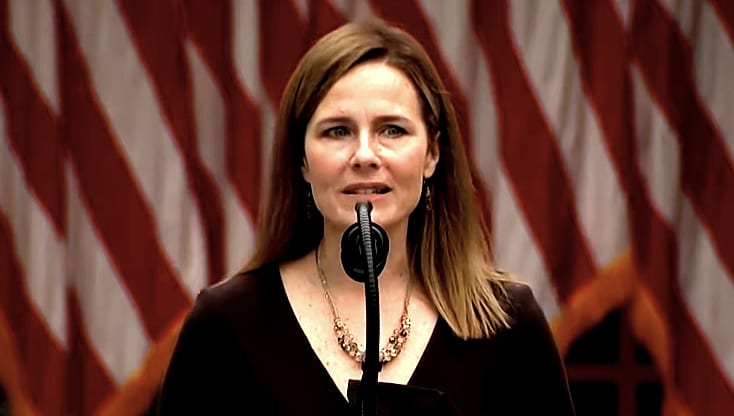SEPTEMBER 27, 2020 BY OPHELIA BENSON

TRUMP chose to nominate a fanatical Catholic – Amy Coney Barrett, above – to replace Ruth Bader Ginsburg on the US Supreme Court. Of course he did, despite being perhaps the least religious president we’d ever had. Before you get excited about Donald Trump the freethinker, remember that he thinks of himself as a god.
Arguments from both political factions have been publicly rehearsed: will Barrett’s religious convictions affect her performance as a supreme court justice, or should they have nothing to do with determining her fitness for such an important role?
This is the absurdity we argue over, or watch pundits arguing over, with every nomination to the court. How can a person’s convictions not affect her performance as a supreme court justice? Or at least how can we safely assume and trust that they won’t?
Nominees all dutifully say that their religious views are in a completely different mental box from their legal reasoning, but then once they’re on the court how very often they decide cases just the way their religious views and affiliations would have predicted. It’s not as if religious bodies refrain from announcing their opinions on various subjects that are relevant to laws and legal interpretations, is it.
It’s permissible to grill court nominees about their other opinions, their mere secular and political and reason-based opinions. It’s only the special magical baseless ones, handed down from on high so long ago that no one knows the source, that are treated as off limits when it comes to really important decisions. Asking about that would be a Religious Test, you see, and that’s forbidden. It’s Article 6 of the Constitution: “no religious Test shall ever be required as a Qualification to any Office or public Trust under the United States.”
At the time it was a religious freedom move, but now it’s working to shield theocratic views on the law from questioning.
The National Constitution Center gives some background:
This prohibition, commonly known as the No Religious Test Clause, banned a longstanding form of religious discrimination practiced both in England and in the United States. In doing so, it provided a limited but enduring textual constitutional commitment to religious liberty and equality that has influenced the way Americans have understood the relationship between government and religion over the last two centuries.
In England, religious tests were used to “establish” the Church of England as an official national church. The Test Acts, in force from the 1660s until the 1820s, required all government officials to take an oath disclaiming the Catholic doctrine of transubstantiation and affirming the Church of England’s teachings about receiving the sacrament. These laws effectively excluded Catholics and members of dissenting Protestant sects from exercising political power. Religious tests were needed, William Blackstone explained, to protect the established church and the government “against perils from non-conformists of all denominations, infidels, turks, jews, heretics, papists, and sectaries.”
So the men (they were all men of course) who worked up the US Constitution said just don’t talk about it at all. The result is there are a lot of religious zealots on the Court and there will soon be another.
So now I want to know more about this People of Praise group (or cult) that Amy Coney Bryant belongs to. Stephanie Kirchgaessner at the Guardian has some basics:
Interviews with experts who have studied charismatic Christian groups such as People of Praise, and with former members of the group, plus a review of the group’s own literature, reveal an organization that appears to dominate some members’ everyday lives, in which so-called “heads” – or spiritual advisers – make big life decisions, and in which members are expected to financially support one another. Married women – such as Barrett – count their husbands as their “heads” and all members are expected to donate 5% of their income to the organization.
In other words the cult (or group) conceptualizes women as officially, universally subordinate to men, which means it sees them as in some way inferior. That’s not a great attribute in a justice on the top court, and it’s downright insulting as a replacement for Ruth Bader Ginsburg.
The group emerged out of the Catholic charismatic movement of the late 1960s, which blended Catholicism and Protestant Pentecostalism – Catholics and Protestants are both members – and adopted practices like speaking in tongues.
Well, I guess it could be worse, they could be snake-handlers.
People of Praise is headed by an all-male board of governors described as its “highest authority”.
Meaning that “highest authority” has to be male … yet here is ACB, up for a job with the highest legal authority the US has. How does that work? Doesn’t she believe that “highest authority” has to be male? Because if she doesn’t, what the hell is she doing in an organization that imposes that belief on her?
None of it makes any sense. It’s like going for a top job at the Center for Disease Control while believing in Christian Science.
Writing for Politico, Massimo Faggioli, a historian and theologian at Villanova University, said there were “tensions” between serving as a supreme court justice, one of the final interpreters of the US constitution, and swearing an oath to an organization he said “lacks transparency and visible structures of authority that are accountable to their members, to the Roman Catholic church, and to the wider public”.
How do we know the People of Praise won’t be telling ACB how to rule?
